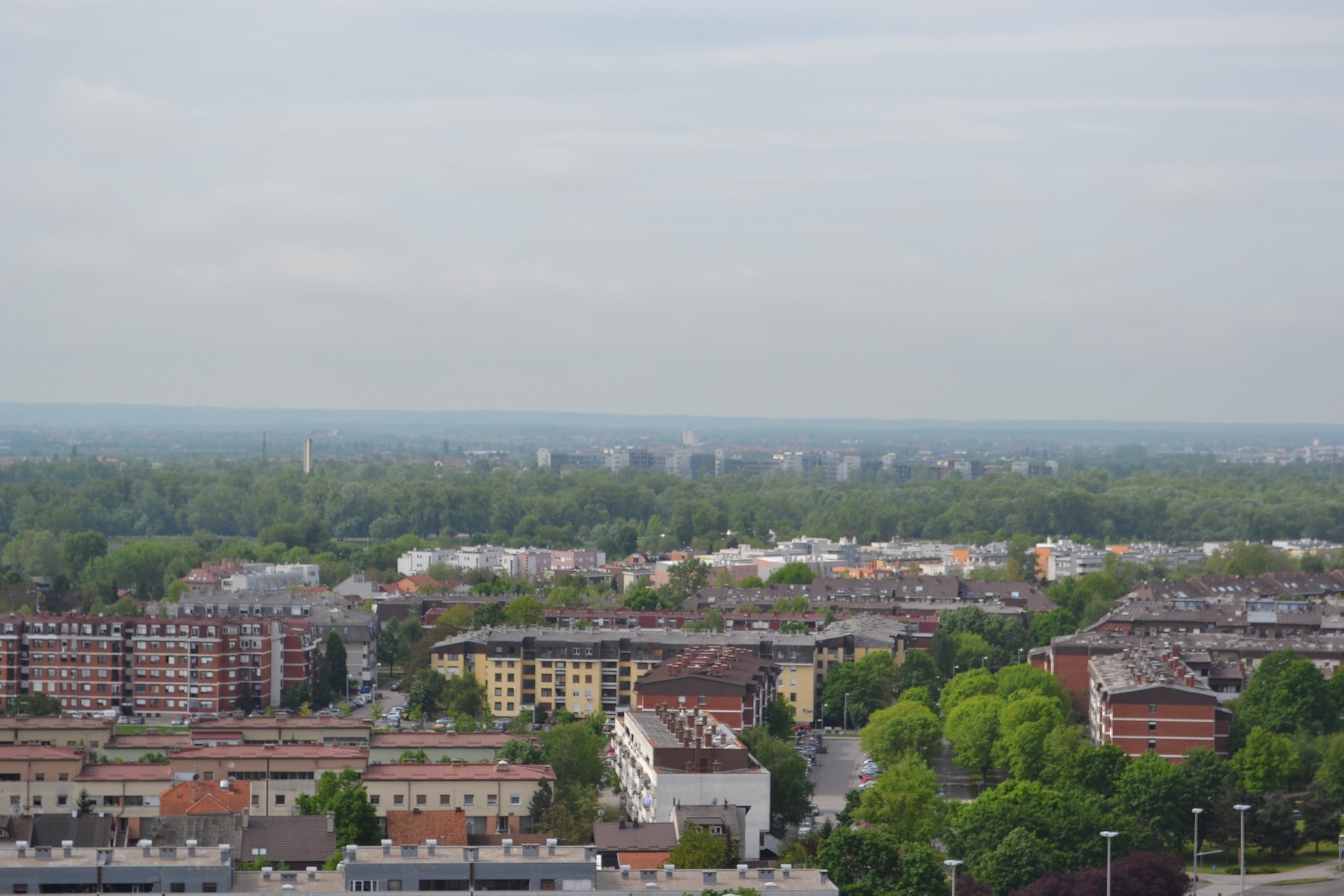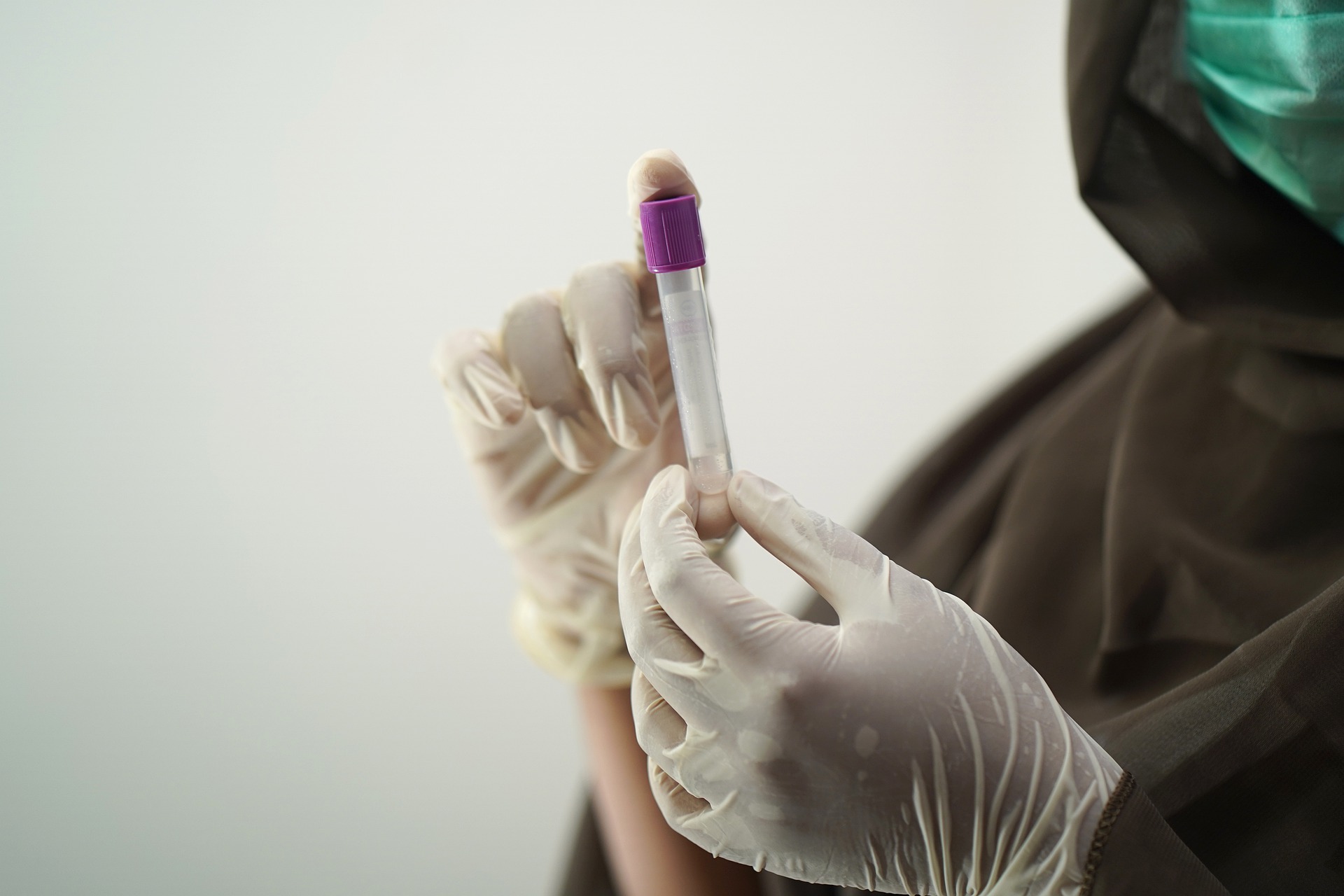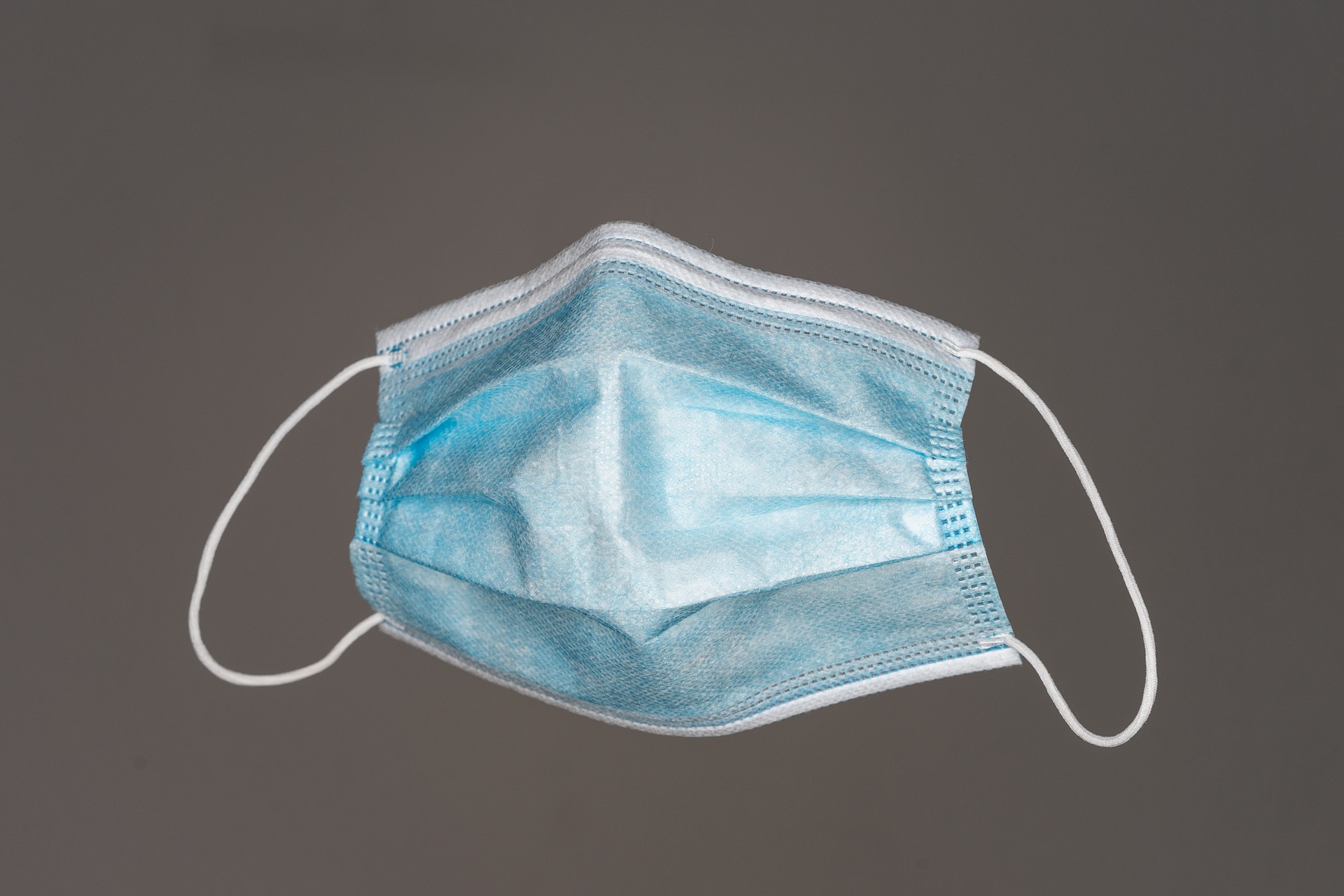Feasibility Study For Hospital Project in Osijek to be Prepared
ZAGREB, 11 May, 2021 - The 35 million kuna contract on the elaboration of a feasibility study for the construction of a new complex housing the hospital centre in Osijek was signed on Tuesday in that biggest eastern Croatian city.
The document on preparing the feasibility study was signed by Health Minister Vili Beroš, the Osijek Hospital Centre head, Željko Zubčić and the representative of the consortium of bidders. As many as 30 million kuna will be provided from European funds, whereas the health ministry will cover the remaining 5.2 million.
Regional Development and EU Funds minister, Nataša Tramišak, said at the contract-signing ceremony that the co-funding from the EU funds was ensured through the "Slavonia, Baranja and Srijem" project.
She said that the construction of the future hospital centre was estimated at two billion kuna, and the exact sum would be known after the Osijek hospital centre provided full information.
Zubčić said that the new hospital centre "is a greenfield investment", and would be built at a new location. He said that the new hospital complex "is a necessity for Osijek and Croatia's east.
The elaboration of the feasibility study is expected to take a year.
(€1 = HRK 7.5)
For more about health in Croatia, follow TCN's dedicated page.
Dignitas: "Patients' Rights are Being Systematically Undermined"
ZAGREB, 31 March, 2021 - Dignitas, the Croatian association protecting the dignity and equality of patients, said on Wednesday that the reform of the healthcare system should be carried out in cooperation with patients and without undermining their rights.
"We appeal to the Ministry of Health, Minister Beroš, and the Croatian government in general to stop systematically destroying the rights of patients," the association said in a statement, adding that the government was deceiving the public by saying that Croatia was among the EU countries with the lowest health contributions.
"Relevant data shows that this is not true. The Minister would now like to impose new taxes and shift an even greater burden onto patients' shoulders without himself offering a single reform during his term that would benefit the patients," the statement said.
The association criticised Minister Beroš for not even trying to stop pharmaceutical companies from saying publicly that the most serious patients, such as those on dialysis and oncological patients, would be left without therapy.
"Pharmaceutical companies have the right to present their problems in public, but the Ministry obviously did not make an effort to stop them from additionally frightening the patients who are anyway worried about their own conditions," the statement said.
Dignitas called on Minister Beroš to "first put the healthcare system in order and see where savings can be made", stressing that savings certainly cannot be made on medical staff and therapy. It said that the healthcare system should be reformed in cooperation with patients, recalling that citizens already contribute a substantial amount of their pay towards healthcare.
For more about health in Croatia, follow TCN's dedicated page.
Croatian Healthcare Workers: Christmas's Forgotten Heroes?
December 28, 2020 – Amidst the difficulties of a second lockdown, a socially distanced Christmas and yet more earthquakes, have we forgotten about Croatian healthcare workers? TCN decided to interview a doctor working on the front line of the fight against COVID
During the first lockdown, it was all about the balconies. Saxophonists, DJs, opera singers – we were entertained on social media by a string of balcony-based stunts that somehow showed resilience, community spirit, humour. Zagreb was no exception. A trend of clapping on balconies in appreciation of healthcare workers passed from country to country and was picked up in Zagreb. After the applause finished, people went back inside. Nothing much had changed. It was a nice enough gesture.
Since the start of summer, no such applause has been heard. Perhaps the release from lockdown gave the signal that the lives of Croatian healthcare workers had also become much easier? That certainly wasn't the case. Though the number of people infected with COVID has grown significantly over recent weeks, Croatian healthcare workers have been treating people sick with COVID since springtime.
Croatian healthcare workers are currently busier with COVID patients than at any time before. And yet, there are no more trips out onto the balconies to show our appreciation for them. Perhaps it's now too cold outside? Perhaps some aren't aware how busy Croatian healthcare workers currently are with COVID patients? Are we perhaps guilty of taking Croatian healthcare workers for granted? Or, maybe we have simply put Croatian healthcare workers to the back of our minds as we struggle with our own challenges?
Throughout this year, TCN has been pleased to report many instances of generosity and innovation directed towards the fight against COVID. Certainly, not everyone in the country is guilty of forgetting about the Croatian healthcare workers who are on the front line fighting this disease. But, how much impact do these instances have on the general lives of Croatian healthcare workers? What is it like to no longer hear the nightly appreciation from our balconies? And, just what is life like as one of the many Croatian healthcare workers battling COVID in the year of the pandemic? TCN decided to interview one to find out.
The doctor we spoke with is a resident physician, working at a smaller community hospital in the continental part of Croatia. They agreed to speak with us on the condition that they do so anonymously.
Looking back at the first lockdown, we didn't know so much about COVID back then. We didn't know exactly how it was spread, the different manifestations of the disease, what course the disease took, nor what the recovery could be like. I think the government did a really good job of responding to the threat as they saw it. We had a small spike in cases, but that is minuscule to what we have now.
I think people generally did what they were told because they thought it would be temporary and they could see the sense in starving the disease out.
At the hospital, we were at first caught a little off guard with the amount of PPE we had and some other resources that we needed. For ICU and ventilators, we were well equipped.
Some of the residents were given some paid leave. It was important to put human resources into tiers. Croatian healthcare workers were certainly more predisposed to catching the disease, simply because they were around it every day.
After such great early successes, I was surprised that everything was relaxed later on to allow the tourist season to take place how it did, and for events like the Vukovar commemoration. It felt like it was a calculated risk. The lockdown we are now in is perhaps too little, too late. The disease is out there now, wild. The numbers of infected people are significantly higher.
The difficulty with this disease is that people can be infected and have very few or no symptoms at all. They might not know they are spreading the virus. You might not know you're sitting next to someone who has it.
Even though we're not at the centre of care for a major population area or city, we saw cases of the disease almost immediately. Our community hospital services an area containing around 150, 000 people. The first cases in April came from nursing homes – elderly, vulnerable people, many with pre-existing conditions. We were well equipped to handle it. Now, we are stretched on a daily basis. We fill the beds with sick people as soon as we empty them.
We wear masks and PPE all day, all the time. All Croatian healthcare workers in hospitals currently do this. Every patient who comes in, regardless of their symptoms, we treat them as though they are carrying the disease.
A lot of residents like me, who are working towards getting their specialty, go to do some periods of work in larger hospitals in the bigger cities. Now, many of those residents have been called back to their community hospitals – we are short on human resources.
The hospital has had to restructure itself significantly. Lots of doctors have been asked to provide cover in the emergency department. Over half of that area is now fully dedicated to COVID.
What do COVID patients look like in regards to their symptoms? It depends on their age and risk group, but you see people who look like they have flu or bacterial pneumonia, you see people who are in acute respiratory distress. Sometimes they have neurological changes, some of them look like they have had a stroke. Some people who have been infected and have supposedly got over the worst of the symptoms, come back in after a month or two with blood clotting problems – blood clots in the legs, which have a tendency to travel up to the lungs and cause a pulmonary embolism. That's a pretty big medical emergency. Some who have pre-existing heart conditions come in with a heart attack triggered by them catching COVID – it's more complicated trying to revive someone when you know they have COVID. The presentation of the disease is so variable.
It's not only older people. I've seen young people be admitted with serious reactions to COVID - young, healthy people who have no pre-existing conditions. I've seen young people come in with mild symptoms, they are sent home with antibiotics and steroids. That is the standard treatment – antibiotics to prevent a bacterial super-infection and steroids to prevent an acute reaction by the body's immune system to COVID. - that's what can cause big problems later on, in the course of the illness. But, sometimes that's not enough. I had a young patient just last week - super healthy, worked out regularly, no pre-existing conditions – and his lungs just looked awful. He had to go to the ICU immediately (sadly, this patient later died). That's like no disease I've ever seen before. Really, COVID is a completely new kind of animal.
The new strain of COVID? There is evidence that it can be spread more easily, and that it can affect more younger people, but there is no evidence that it is any more severe. The vaccines will work against it.
We're short on ventilators now. Really, we need two free ventilators at any time, in case there is an emergency admission. We are not currently in the position where we always have two free ventilators – sometimes they are all in use. That's a worry. I worked one shift where the anaesthesiologist said “We just don't have any more space for them – we will just have to put them in the hallway”. I've never seen that before.
I've heard of Croatian healthcare workers, colleagues in other hospitals getting sick with COVID and the hospital asks them to prove they got sick at work. It's pretty clear that's the most likely place they would have got sick because they're working with COVID patients. They were forced to be off work, but only on a lower level of sick pay. If you get ill because of being at work, you get full pay. But, they couldn't prove it, so they didn't get that.
I've been lucky – I haven't caught COVID yet. Well, as far as I know. My pay hasn't gone down, it's gone up – but only because I'm working so many double shifts. I volunteer to provide cover when other members of staff get sick. The specialists – the consultant doctors – they have it worse than us resident doctors. They are more responsible, so they are expected to work more hours. Nobody is pressured or threatened into picking up extra shifts, it's just something that almost all of us just do.
I've read some nice stories about fundraising efforts and donations to Croatian healthcare workers and hospitals in different parts of the country. Everything is appreciated. But, I personally haven't seen any effect of that on our day to day lives at work. Not at our hospital. Maybe there were PPE donations or cash donations, but it hasn't impacted the daily lives of me and the Croatian healthcare workers who are my colleagues. I think I heard that a local garage was giving free cups of coffee if you show your medical ID. Every little is appreciated.
For me and the Croatian healthcare workers who are my colleagues, instead of any kind of personal discounts or donations to staff, we would much prefer if people just took this disease more seriously. Things look very different when you work in a hospital compared to someone outside who maybe doesn't know anyone who got sick.
I came off a particularly difficult double shift a couple of months ago – it was just non-stop COVID admissions, some severe cases. As I was walking home, I walked past a bar that's near to the hospital. They had signs on the walls telling people to keep their distance. But, the bar was absolutely packed – full of young people. It just felt so disappointing. I couldn't help but think of the older relatives they would come in contact with, some who might get really sick.
Instead of people clapping on balconies, I think Croatian healthcare workers would just prefer more general vigilance and personal responsibility – wear your mask, wash your hands regularly, no more parties in the basement. Clapping on balconies is a nice gesture, but ultimately it's an empty one.
How does it feel to know that there are some people out there, in every country, all around the world, who believe COVID is a hoax, or a plot, or not so serious, or that the vaccine is dangerous or something other than what it is?
Well, it's not always the content of the conspiracy theory that appeals to these people as much as it is their inability to accept facts – the truth – because they have little faith in the authorities that are telling them this. Here in Croatia, I think that distrust is quite high – a lot of people are disillusioned with the state and politics, because of corruption. Sometimes over 50% of the population choose not to vote. The dissemination of misinformation over social media doesn't help - if that's where people get their news from. If you look at that example from your own country, where strict measures about movement were put in place by your government, and immediately afterward, the Chief Advisor to the Prime Minister, was caught breaking them to travel across the country with his family to a second home in the countryside, going out on day trips. And he was defended by his colleagues after he was found out! When people see those kinds of things happening, the distrust between people and the authorities just grows.
All of the images in this article are used as illustrations only. None of the places or people depicted are in Croatia or Croatian, except for the first image, a panorama of Zagreb
Number Of Hospitalized COVID-19 Patients In Croatia Up 110% - Newspaper
ZAGREB, Sept 5 (Hina) - The number of hospitalized COVID-19 patients in Croatia has increased by as much as 110% in the past 15 days, Jutarnji List daily said on Saturday, adding that the growing number of severe cases is worrying.
Although the actual figures do not seem so terrifying, because 135 people were receiving hospital treatment for COVID-19 on August 21, while their number on September 4 was 283, the trend is a serious cause for concern, the newspaper said.
The number of active cases in this period jumped by 47%, which is more than half the increase in the number of hospitalized patients, as the number of active cases rose from 1,841 on August 21 to 2,703 on September 4.
A further cause for concern is the fact that the share of hospitalized COVID-19 patients in Croatia in the total number of infected people was 7.33% on August 21, while on September 4 it was 10.5%, Jutarnji List said, adding that the number of deaths in the said period rose from 169 to 195.
These figures are not surprising given that Croatia has been seeing negative trends for days now, and it was only logical that this situation would also affect the hospitals, which were not under too much strain this summer despite the constant presence of the virus. This was mostly due to the fact that symptoms of the disease were milder than those seen during the first wave of the epidemic from March to June, and the fact that people spent much more time outdoors, Jutarnji List said.
For the latest travel info, bookmark our main travel info article, which is updated daily.
Read the Croatian Travel Update in your language - now available in 24 languages
Zagreb Children's Hospital Gets Therapy Dog
September 3, 2020 – A Zagreb Children's Hospital is preparing to welcome its first canine member of staff – Jupi, a border collie
They are often said to be the most intelligent of all dogs. Used traditionally for herding livestock, border collies can learn a very large number of signals and commands. They are eminently trainable. Now, that intelligence is to be applied to the area of therapy, as one Zagreb children's hospital prepares to welcome its first border collie as a member of the team.
Still only a puppy, Jupi is being prepared for the role by her owner, Iva Zečević, a clinical psychologist at the Psychiatric Hospital for Children and Adolescents. At the moment, Jupi still needs to get her jabs, go for training and pass a therapy dog exam, Iva revealed to Jutarnji List journalist Lada Novak Starčević in a recent interview.
Border collies are very intelligent and eminently trainable. They take their name from the sheep farming lands which are situated on both sides of the Anglo-Scottish border © Yuppy Ermeton
Iva is undertaking the training herself with help from puppy coach Ana Odak and The Croatian Association for the Training of Guide Dogs and Mobility. Iva decided to dedicate herself personally to the task because she knows the Zagreb Children's Hospital where she works would struggle to pay for a fully trained therapy dog. Despite the time and costs involved in the necessary process, Iva has previously seen the positive effects dogs can have on her patients and knows it's a worthwhile undertaking. She is an experienced dog owner and has kept and trained several, although this is the first she has trained as a therapy dog.
Border collies are so clever that they thrive best in households that can give them lots of play and exercise. It is a British breed of dog, taking its name from the sheep farming lands which are situated on both sides of the Anglo-Scottish border. The word collie comes from the old Celtic word for useful.
All of today's purebred border collies can trace an ancestral line back to one dog. Old Hemp lived in Northumberland between 1893 and 1901 and was so skilled in his work with sheep, as well as having exactly the right temperament, that many shepherds used him as a stud for their future working dogs. Old Hemp is believed to have sired as many as 200 puppies to be reared as sheepdogs.
For the latest travel info, bookmark our main travel info article, which is updated daily.
Read the Croatian Travel Update in your language - now available in 24 languages
Croatian Health Insurance Fund Unveils Method to Shorten Waiting Lists
As Poslovni Dnevnik/Marija Crnjak writes on the 22nd of December, 2019, according to the Croatian Health Insurance Fund (HZZO), patients will have what they needed ordered by their family doctors, while procedures such as MR and CT scans, as well as cataract examinations and gastroscopies will be booked by specialists or hospital administrators.
This manner of doing things will reduce waiting lists, help to prevent confusion and aid both patients and the hospitals conducting the procedures themselves, ensuring a better delivery of service and more satisfaction on both ends.
The brand new, unique calendar for ''ordering'' diagnostic procedures for patients in hospitals was launched this week, which should introduce more order in queues and reduce waiting lists for nine medical procedures, and so far, 42 of 64 Croatian hospitals have been included in the calendar, the Croatian Health Insurance Fund (HZZO) stated on Thursday.
The Croatian hospitals included are those that have a compatible IT system, while other hospitals will be networked in properly by May next year. The new ordering method currently covers nine long-awaited procedures, MR and CT scans, Holter ECG, heart ultrasounds, ergometry, cataract surgery, breast ultrasounds, thyroid gland ultrasounds and gastroscopies, and the Croatian Health Insurance Fund's plans are to continue to expand this list.
As mentioned, according to HZZO's new method, patients will have what they needed ordered by their family doctors, while procedures such as those listed above will be arranged by specialists or by hospital administrators. Patients will also be able to cancel their appointments through the eGrađanin (eCitizen) health portal, as well as arrange for the changing of the dates and medical institution for certain procedures.
"A single ordering calendar will prevent multiple patient orders from hospitals, which currently unrealistically increases waiting lists, and ordering by OIB automatically prevents the same person from ordering at another institution," HZZO Director Lucijan Vukelić said during a recent press conference.
Since the establishment of the system on December the 15th, 2019, as many as 1088 multiple orders have been detected in just three days, meaning that the Croatian Health Insurance Fund's new system works.
Make sure to follow our dedicated lifestyle page for much more.
12 Million Kuna Investment for Rovinj Hospital in Next 15 Months
As Novac/Barbara Ban writes on the 26th of February, 2019, ''Dr. Martin Horvat'' Rovinj Hospital has proudly stated the fact that in 2019, it plans to invest heavily in the amount of 12 million kuna, and it ended 2018 in a surplus in regard to finance and the number of patients. They claimed that they had 500 patients more than one year earlier, that they provided 16,440 more medical services than they did last year, marking an increase of 26.5 percent.
Rovinj Hospital finished of the business year of 2018 with a financial gain of 623,000 kuna. This is the fifth year in a row that Rovinj Hospital has managed to conclude with some excellent financial results, with all of our employees being paid all of their salaries within the deadline, as well as regressions, Christmas bonuses, vouchers, jubilee awards, money for children for St. Nicholas, retirement benefits, sickness benefits, and assistance in accordance with our underlying collective agreement. I'm proud to show this positive change and an increase in the number of visits to our institution from year to year because better implementation means better addressing the needs of our citizens,'' says dr. sc. Marinko Rade, who was recently elected to the Working Group of the Ministry of Health for the drafting of the Ordinance on Health Tourism.
Investments of 12 million kuna are planned to be carried out over the next fifteen months, and alterations have already begun in the department where the patients from the AUVA insurance company stay during their time at Rovinj Hospital. The hospital's entire roof will be changed, the façade will be renewed, and works on the hospital's energy sources will be carried out, a new elevator will also be installed. The total value of these investments currently stands at five million kuna, with renovation of the main building also planned.
''Investments for a further seven million kuna will be issued shortly, including the renovation of the façade, the replacement of the entire roof, and works regarding the change of the energy [system] of the main building of the hospital, where there are clinics and departments in which our local patients are treated. We're investing the most in these departments. Reconstruction should start at the end of 2019,'' added Rade.
He added that so far, everything they invested has been covered by money from the hospital's significant profits, and now they are financially secure enough to safely borrow. In addition to all of the works Rovinj Hospital is set to undergo, a library will be opened soon in the department, and a new therapeutic park will be set up.
''So far, we've collected 6,000 books donated by citizens, which is a truly impressive and record-breaking number for a public action. At this time, we're separate the books by their categories and languages, and we're renewing the space where the library will be located at the department. Additionally, the placement of a therapeutic park is ongoing, which is being carried out within the Design/Build project in collaboration with the George Washington University from the USA. The project will be completed by April this year,'' noted Rade.
Rovinj Hospital isn't ''only'' planning to invest in buildings, but also in their much appreciated employees, in terms of their continued and additional education. This will amount to up to 250,000 kuna.
''This is the money that this institution allocates from its income, ie, from the income generated from the private market,'' Rade added that owing to several factors, Rovinj Hospital can't raise anyone's salary regardless of their position, and that's why the hospital's administration has been looking for more innovative ways to properly reward and thus hopefully retain such valued employees, and one way is to pay them in continued, additional education.
''Of course, doctors and healthcare staff are paid for their training and for congresses in order to become superior in their specialties, which means more access to patients. But we're also investing in the non-medical staff who work in our hospital, which I consider to be equally important links in the chain. This means that, let's say, chefs and cooks can receive paid education which then allows them to progress and provides them with technical education and training that can help them out more in their day-to-day work. That's why we've reserved a lot of money,'' concluded the director of Rovinj Hospital.
For more on investment in Croatia, healthcare, health tourism in Croatia and much, much more, give our business page a follow.
Click here for the original article by Barbara Ban for Novac/Jutarnji
Zagreb Clinical Hospital Centre Terminates Croatia’s Best Neurosurgeon
Despite being willing to work in retirement, it seems that the largest Croatian hospital has no need for one of Croatia’s best surgeons.
Children's Hospital Project: Unfinished University Hospital Becomes "New Klaićeva"
Will a praiseworthy new project in an unfinished building in the capital be realised?


